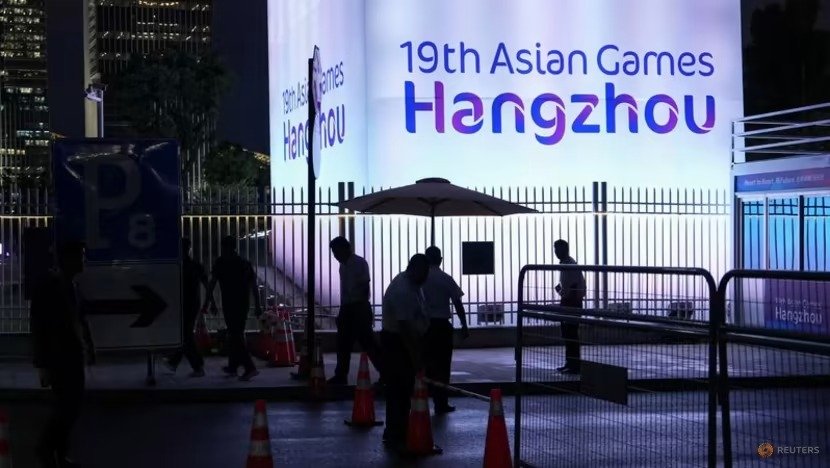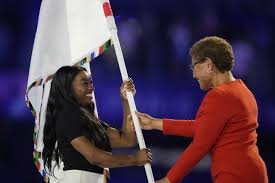Hangzhou (China), Sept 21 (AP) The Asian Games are an attention grabber.
For starters, they involve more participants than the Summer Olympics. Organizers say more than 12,000 will be entered when the opening ceremony takes place Saturday in the eastern Chinese city of Hangzhou. This is more than the 10,500 expected for next year’s Paris Olympics.
The giant numbers are partly due to the staggering array of events with many regional specialties, sports, and games you won’t find in the Olympics. And there’s also cricket, which appears headed to the Olympics as soon as 2028 in Los Angeles, and certainly for 2032 in Brisbane, Australia.
And there’s squash, which has tried several times for Olympic recognition.
The regional fare includes dragon boat racing, sepaktakraw — sometimes called “kick volleyball — wushu, a Chinese martial art, and kabaddi, a popular contact sport on the Indian subcontinent. There is also the non-Olympic martial art of ju-jitsu, and kurash, a form of wrestling popular in central Asia.
To this, add a long list of what organizers call “mind sports” from bridge to chess to xiangqi (Chinese chess) to esports.
Of course, there are the old standbys seen in every Olympics like track and field, swimming, or volleyball — and the usual grandiose opening and closing ceremonies. Nine sports will offer qualification spots for the Olympics — archery, artistic swimming, boxing, breaking, hockey, modern pentathlon, sailing, tennis, and water polo.
However, most of the 481 events offer a chance for smaller delegations to win medals, which is often impossible at the Olympics.
China won almost 300 overall medals at the last Asian Games in Indonesia in 2018. At the bottom of the table, Syria and Nepal won a lone medal each. Bhutan and Bangladesh were among nine delegations that didn’t win any.
China will dominate the medal table as it has for the last 40 years, followed by Japan and South Korea — Asia’s other powers. The vast region stretches from Lebanon on the Mediterranean, through central Asia and the Indian subcontinent, to North Korea with organizers saying 45 nations or territories are entered.
Organizers have said 191 participants from North Korea will be on hand. North Korea closed it border early in 2020 after the COVID-19 pandemic and skipped the Tokyo Olympics, which were delayed a year until 2021. The Asian Games were also pushed back a year from 2022 because of the pandemic.
According to South Korea’s Unification Ministry, the last time North Korean athletes appeared in an international sports competition was January 2020, when North Korea competed in the Asian Football Confederation’s under-23 soccer championship.
If you like political intrigue, there may be plenty of it.
The self-governing island of Taiwan will be on hand in China, which claims the democracy as a breakaway province that it has vowed to reclaim it. Known as the Republic of China, the island is officially listed as Chinese Taipei in the Olympics and Asian Games and marches under a white flag adorned with the Olympics rings. Its red, blue and white flag is in not allowed.
Taiwan, with only 23.5 million, is a relative sports power in the region and finished seventh in the overall medal standings in Indonesia.
The games also begin amid an open power struggle between International Olympic Committee President Thomas Bach and Kuwait’s Sheikh Ahmad Al-Fahad Al-Sabah, a long-time IOC member who is often described as the “kingmaker” who helped Bach win the IOC presidency in Buenos Aires in 2013.
The Switzerland-based IOC openly intervened in July to invalidate the presidential election of the Olympic Council of Asia. It has also suspended Sheikh Ahmad from the IOC.
The election was ostensibly won by Kuwait’s Sheikh Talal Fahad Al-Ahmad Al-Sabah, the younger brother of Sheikh Ahmad. The elder sheikh is the former 30-year president of the OCA, an organization that was created by his father.
The IOC says it will continue to recognize Randhir Singh of India as interim president of the OCA until new elections are held. Bach will attend the opening ceremony in Hangzhou and is sure to have talks with Singh.
The biggest event of the games might be a possible India vs. Pakistan gold-medal game in men’s cricket on Oct. 7, which would be one of the most-watched global sports events all year. It comes just as cricket’s world cup is also underway.
China will again dominate diving, and several of China’s top swimmers — fresh from the world championships two months ago in Fukuoka, Japan — will shine. The field in gymnastics is weakened since the world championships in Antwerp, Belgium, clash with the Asian Games.
The biggest winner at the Asian Games might be South Korea esports star Lee Sang-hyeok, who is also known as “Faker.” If he wins gold he will be granted an exemption from military service.
Tottenham Hotspur soccer forward Son Heung-min also bypassed a 21-month military stint because of a government exemption when South Korea won the gold medal in soccer at the 2018 games in Indonesia — although Son still had to do three months of basic training.












